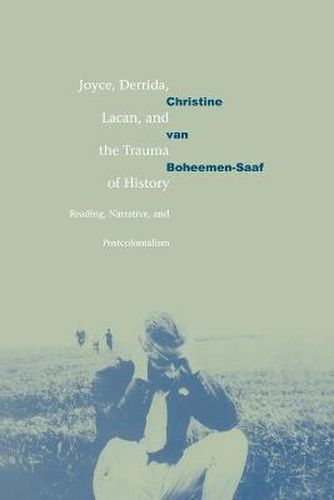Readings Newsletter
Become a Readings Member to make your shopping experience even easier.
Sign in or sign up for free!
You’re not far away from qualifying for FREE standard shipping within Australia
You’ve qualified for FREE standard shipping within Australia
The cart is loading…






In Joyce, Derrida, Lacan and the Trauma of History, Christine van Boheemen-Saaf examines the relationship between Joyce’s postmodern textuality and the traumatic history of colonialism in Ireland. Joyce’s influence on Lacanian psychoanalysis and Derrida’s philosophy, Van Boheemen-Saaf suggests, ought to be viewed from a postcolonial perspective. She situates Joyce’s writing as a practice of indirect ‘witnessing’ to a history that remains unspeakable. The loss of a natural relationship to language in Joyce calls for a new ethical dimension in the process of reading. The practice of reading becomes an act of empathy to what the text cannot express in words. In this way, she argues, Joyce’s work functions as a material location for the inner voice of Irish cultural memory. This book engages with a wide range of contemporary critical theory and brings Joyce’s work into dialogue with thinkers such as Zizek, Adorno, Lyotard, as well as feminism and postcolonial theory.
$9.00 standard shipping within Australia
FREE standard shipping within Australia for orders over $100.00
Express & International shipping calculated at checkout
In Joyce, Derrida, Lacan and the Trauma of History, Christine van Boheemen-Saaf examines the relationship between Joyce’s postmodern textuality and the traumatic history of colonialism in Ireland. Joyce’s influence on Lacanian psychoanalysis and Derrida’s philosophy, Van Boheemen-Saaf suggests, ought to be viewed from a postcolonial perspective. She situates Joyce’s writing as a practice of indirect ‘witnessing’ to a history that remains unspeakable. The loss of a natural relationship to language in Joyce calls for a new ethical dimension in the process of reading. The practice of reading becomes an act of empathy to what the text cannot express in words. In this way, she argues, Joyce’s work functions as a material location for the inner voice of Irish cultural memory. This book engages with a wide range of contemporary critical theory and brings Joyce’s work into dialogue with thinkers such as Zizek, Adorno, Lyotard, as well as feminism and postcolonial theory.